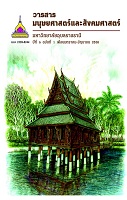การหันกลับมาศึกษาที่ดินกับชาวนาและพลวัตสังคมชนบทอีสานในศตวรรษที่ 21
Main Article Content
บทคัดย่อ
ปัจจุบัน ที่ดินถูกพิจารณาว่า ไม่ได้เป็นหัวใจของการทำความเข้าใจสังคมชนบทอีกต่อไป อย่างไรก็ตาม บทความนี้โต้แย้งว่า การทบทวนความสัมพันธ์ระหว่างชาวนากับที่ดินใหม่ในบริบทโลกาภิวัตน์ จะช่วยทำให้เรามองเห็นพลวัตของสังคมชนบทและเข้าใจชาวนาในมิติที่หลากหลายภายใต้บริบทประวัติศาสตร์อันเฉพาะเจาะจง ด้านหนึ่ง การกลับมาศึกษาที่ดินทำให้เราเห็นว่าชาวนาได้เข้าไปเป็นส่วนหนึ่งของรัฐและทุนนิยมอย่างแนบแน่น แต่อีกด้านหนึ่ง ชาวนาในฐานะผู้กระทำก็มียุทธศาสตร์การดำรงชีพที่หลากหลาย การกลับมาพึ่งพาที่ดินได้สะท้อนให้เห็นพื้นที่ชนบทอีสานรูปแบบใหม่ในศตวรรษที่ 21 คือ กระบวนการลดทอนความเป็นชาวนาและการกลับมาเป็นชาวนาส่งผลให้คนในชนบทมีปฏิกิริยาและการต่อต้านในรูปแบบที่ซับซ้อน การก้าวเข้ามามีบทบาทของเศรษฐกิจอย่างไม่เป็นทางการ และความแตกต่างในสังคมชนบทที่ถูกสร้างขึ้นในชนบทอีสาน
Re-studying Land and Peasantry: The Dynamics of Rural Society in the 21st Century
This research argued that a re-study of the relationship between peasants and land in a globalization context helps an understanding of the dynamics of rural society by locating peasants on multiple scales and in specific historical trajectories. Such a re-study shows that peasants engage closely with capitalism and state and, at the same time; as actors have various livelihood strategies. The return of land dependency clearly reflects the three emerging new rural spaces in the 21st century, the process of depeasantization and repeasantization that build a complex form of the reactions and resistances of rural people, the role of informal economy, and rural differentiation which has been established in rural Isan.
Article Details
บทความที่ได้รับการตีพิมพ์เป็นลิขสิทธิ์ของวารสารมนุษยศาสตร์และสังคมศาสตร์ มหาวิทยาลัยอุบลราชธานี
ข้อความที่ปรากฏในบทความแต่ละเรื่องในวารสารวิชาการเล่มนี้เป็นความคิดเห็นส่วนตัวของผู้เขียนแต่ละท่านไม่เกี่ยวข้องกับมหาวิทยาลัยอุบลราชธานี และคณาจารย์ท่านอื่นๆในมหาวิทยาลัยฯ แต่อย่างใด ความรับผิดชอบองค์ประกอบทั้งหมดของบทความแต่ละเรื่องเป็นของผู้เขียนแต่ละท่าน หากมีความผิดพลาดใดๆ ผู้เขียนแต่ละท่านจะรับผิดชอบบทความของตนเองแต่ผู้เดียว


